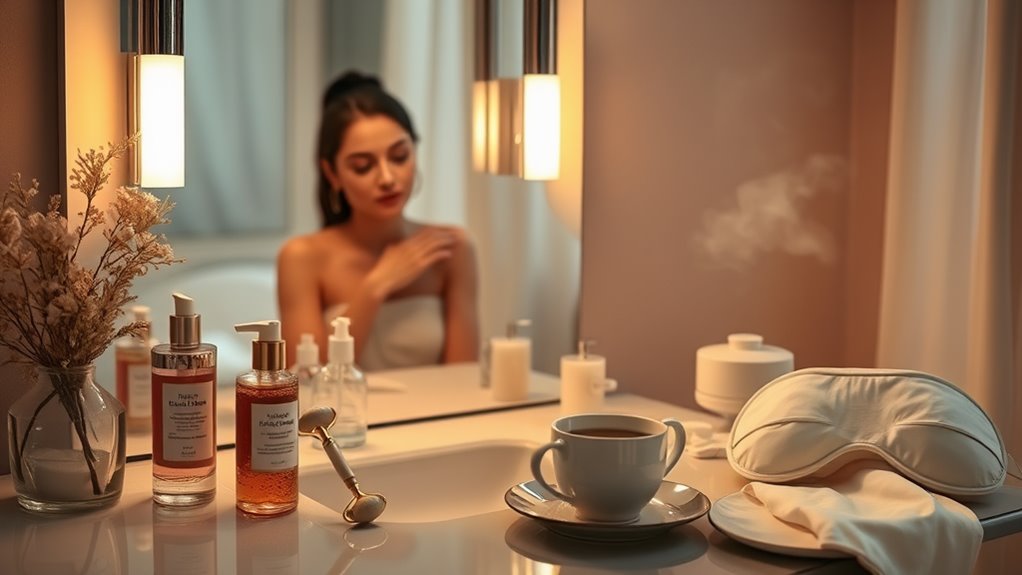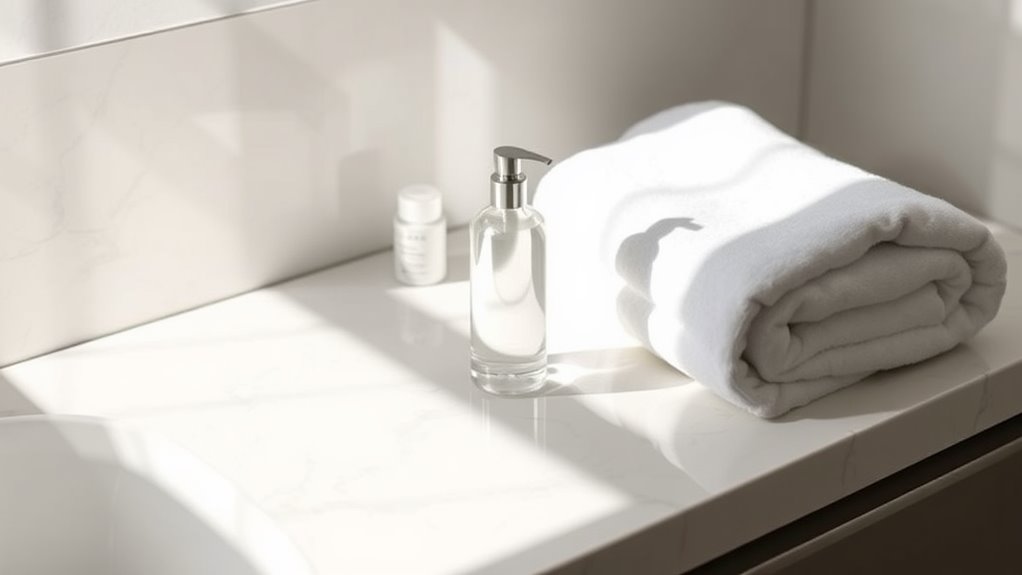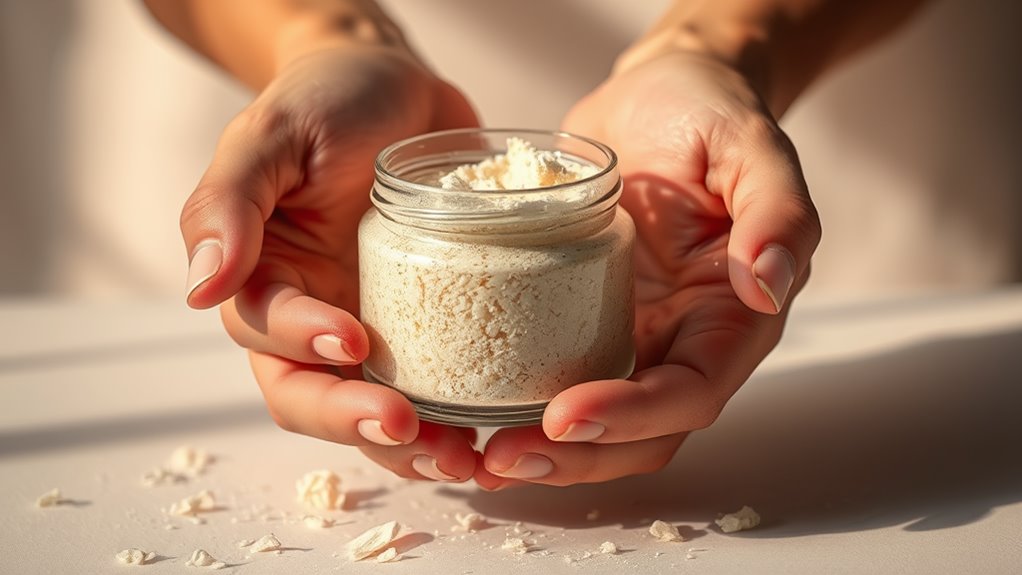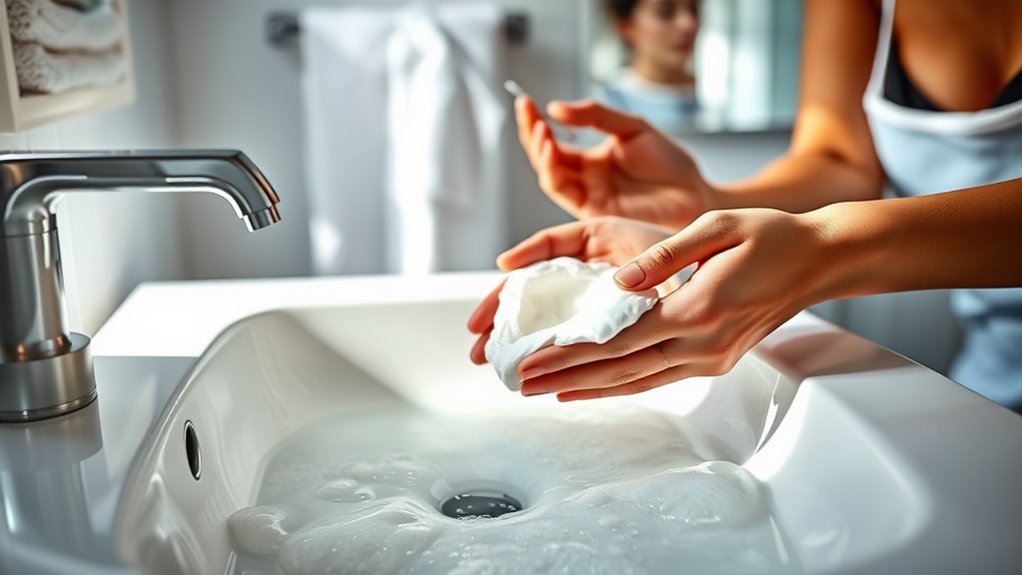Your Night Routine Might Be Aging You – Here’s How to Fix It
Your night routine could be accelerating signs of aging without you even realizing it. Skipping hydration or not cleansing properly leads to fine lines and breakouts. Incorporating antioxidants and retinoids boosts skin repair while you sleep, enhancing your complexion. Prioritize quality sleep and create a calming environment to support skin regeneration. Consistency is key, so establish a routine that works for you. Keep going to uncover more tips for rejuvenating your night habits and achieving healthier skin.
Key Takeaways
- Ensure you cleanse your face nightly to remove makeup and impurities, preventing clogged pores and dull skin.
- Incorporate hydrating serums and moisturizers rich in antioxidants to boost skin repair and maintain elasticity overnight.
- Aim for 7-9 hours of quality sleep to enhance skin cell regeneration and reduce visible signs of aging.
- Establish a calming pre-sleep routine, avoiding screens, to promote relaxation and improve sleep quality.
- Regular facial massage enhances circulation and product absorption, helping to reduce puffiness and improve skin texture.
Understanding the Importance of a Night Routine
While you might think of a night routine as just a set of habits before bed, it plays a crucial role in your overall well-being and can significantly impact the aging process.
A consistent night skincare routine helps your skin repair and regenerate, combating the effects of environmental stressors. During sleep, your skin is more receptive to treatments, so incorporating serums and moisturizers rich in antioxidants and peptides can enhance cellular renewal. Additionally, nightly skincare rituals can help address various skin concerns, ensuring you wake up with a refreshed and revitalized complexion.
Research shows that proper hydration and nourishment can lead to a visibly healthier complexion and improved elasticity.
Furthermore, a calming routine reduces stress, which can also slow down skin aging. Prioritizing these nightly rituals isn’t just about vanity; it’s an investment in your long-term health and vitality.
Common Mistakes That Accelerate Aging
Your Night Routine Might Be Aging You – Here’s How to Fix It
Common Mistakes That Accelerate Aging
Neglecting your night routine can lead to premature aging, as certain common mistakes significantly undermine your skin’s health.
Skipping nightly hydration is one major error; without moisture, your skin loses elasticity and develops fine lines.
Additionally, neglecting to remove makeup can clog pores, leading to breakouts and dullness.
Overlooking the importance of sleep can also accelerate aging, as your body repairs itself during this time.
Using harsh or irritating products can strip your skin of its natural barrier, causing inflammation and sensitivity.
Lastly, failing to incorporate antioxidants into your routine means missing out on vital protection against environmental damage. A proper night skincare routine can help counteract these effects and promote a more youthful appearance.
Avoid these pitfalls, and you’ll pave the way for a healthier, more youthful complexion.
The Role of Cleansing in Skin Health
Cleansing plays a vital role in maintaining healthy skin, especially after a long day. It helps remove dirt, makeup, and excess oils that accumulate on your skin’s surface.
If you skip this step, you risk clogging your pores, leading to breakouts and dullness. Studies show that a clean complexion allows your skin to better absorb treatments, enhancing their effectiveness. Additionally, avoiding harsh cleansing methods can prevent common cleansing mistakes that exacerbate acne breakouts.
Choose a cleanser that suits your skin type; for example, gel cleansers work well for oily skin while cream-based options are ideal for dry skin.
Aim to cleanse twice daily—morning and night—to keep your skin balanced.
Moisturizing: Choosing the Right Products
How do you choose the right moisturizer for your skin type? Selecting the perfect product can transform your nighttime routine and enhance your skin’s health. Here’s a quick guide to help you make the best choice:
-
Skin Type: Identify if your skin is oily, dry, combination, or sensitive. For oily skin, opt for lightweight, gel-based formulas; for dry skin, choose rich, cream-based moisturizers.
-
Ingredients: Look for key ingredients like hyaluronic acid for hydration, glycerin for moisture retention, and antioxidants to combat free radicals.
-
Consistency: Consider the consistency of your moisturizer. Lighter lotions are great for warmer climates, while thicker creams provide extra hydration in cooler months. Additionally, ensure that your moisturizer is formulated to avoid common mistakes that can worsen tight, dry skin.
The Impact of Sleep Quality on Skin Aging
While you might prioritize serums and creams in your skincare routine, the quality of your sleep plays a crucial role in how your skin ages.
Research shows that inadequate sleep can lead to increased signs of aging, such as fine lines, dullness, and uneven texture. During deep sleep, your body releases growth hormones that help repair skin cells and promote collagen production. Additionally, better sleep habits can significantly enhance your skin’s overall appearance and health.
Conversely, poor sleep disrupts this process, leading to inflammation and a breakdown of collagen. Aim for 7-9 hours of uninterrupted sleep each night to maximize your skin’s regenerative abilities.
Create a calming bedtime routine, reduce screen time before bed, and ensure your sleep environment is comfortable. Prioritizing sleep can be your most effective anti-aging strategy.
Incorporating Antioxidants and Retinoids
Incorporating antioxidants and retinoids into your night routine can significantly enhance your skin’s resilience against aging.
Antioxidants neutralize free radicals, while retinoids boost cell turnover and collagen production, leading to a more youthful appearance.
To maximize their benefits, pay attention to the application techniques and timing for optimal results.
Importance of Antioxidants
As you navigate the complexities of aging, understanding the role of antioxidants in your nighttime routine can significantly impact your skin’s health. Antioxidants protect your skin from free radicals, helping to maintain its youthful appearance.
To effectively incorporate them, consider these key steps:
-
Choose products with Vitamin C****: This powerful antioxidant brightens your complexion and reduces signs of aging.
-
Look for niacinamide****: It not only fights free radicals but also strengthens the skin barrier, enhancing moisture retention.
-
Incorporate green tea extract****: Rich in polyphenols, it combats inflammation and soothes tired skin.
Benefits of Retinoids
When you add retinoids to your nighttime routine, you’re not just tackling signs of aging; you’re enhancing the overall effectiveness of your skincare regimen.
Retinoids, derived from vitamin A, promote cell turnover and boost collagen production, leading to smoother, firmer skin. They help reduce fine lines, wrinkles, and hyperpigmentation, giving you a more youthful appearance.
When combined with antioxidants, like vitamin C or E, retinoids become even more potent, fighting free radicals that cause skin damage. This powerful duo not only repairs existing signs of aging but also prevents future issues.
Incorporating retinoids into your routine can transform your skin’s texture and tone, making it look vibrant and revitalized. Embrace this dynamic combination for lasting results.
Application Tips and Techniques
To maximize the benefits of retinoids and antioxidants in your nighttime routine, it’s essential to apply them correctly. Here are three key techniques to enhance their effectiveness:
-
Layering: Apply antioxidants first, allowing them to penetrate deeply. Follow with retinoids, which can be slightly thicker and help seal in the benefits.
-
Timing: Wait at least 20 minutes after cleansing before applying retinoids. This allows your skin’s pH to return to normal, reducing irritation.
-
Moisturizing: Always finish with a hydrating moisturizer. This helps lock in moisture and prevents dryness, optimizing the performance of both retinoids and antioxidants.
The Benefits of Facial Massage Before Bed
Facial massage before bed offers a range of benefits that can enhance your nightly routine and promote healthier, more youthful skin. By stimulating blood circulation, you help deliver oxygen and nutrients to your skin cells, supporting cell regeneration. This increased circulation can reduce puffiness and improve skin tone, making your complexion look radiant.
Additionally, facial massage encourages lymphatic drainage, which helps eliminate toxins and reduces inflammation. You’ll also find that the soothing motions can alleviate tension in your facial muscles, promoting relaxation and reducing stress, which is crucial for overall skin health.
Incorporating this simple practice into your routine can boost the effectiveness of your nighttime skincare products, allowing them to penetrate deeper and work more effectively while you sleep.
Creating a Relaxing Environment for Better Sleep
To create a relaxing environment for better sleep, start by adjusting your room’s lighting to a dim, soothing level.
Incorporating calming aromatherapy options, like lavender or chamomile, can further enhance your sleep experience.
Don’t forget to invest in cozy bedding that makes you feel comfortable and secure, as these elements combined can significantly improve your overall rest.
Dim Lighting Essentials
As you wind down for the evening, dim lighting plays a crucial role in signaling your body that it’s time to relax and prepare for sleep.
Bright lights can disrupt your circadian rhythm, so consider these essentials for a calming atmosphere:
-
Use Soft, Warm Bulbs****: Opt for bulbs with a lower lumen output and a warm color temperature to create a cozy environment.
-
Incorporate Dimmer Switches****: Installing dimmer switches allows you to adjust the brightness according to your mood, enhancing relaxation.
-
Utilize Lamps and Candles: Instead of overhead lights, use table lamps or candles to diffuse soft light throughout your space.
Implementing these dim lighting strategies can significantly improve your nighttime routine, promoting restful sleep and ultimately supporting your overall well-being.
Calming Aromatherapy Options
How can calming aromatherapy transform your nighttime routine? Incorporating essential oils like lavender, chamomile, and bergamot can profoundly enhance your sleep quality.
Research shows that these scents reduce anxiety and promote relaxation by influencing your brain’s limbic system, which regulates emotions. To create a soothing atmosphere, consider using a diffuser or adding a few drops to your pillow.
You might also try an aromatherapy roll-on for targeted application on pulse points. Experiment with different combinations to find what resonates with you, as personal preference plays a significant role in effectiveness.
Cozy Bedding Selection
Creating a cozy bedding selection is essential for fostering a relaxing environment that promotes better sleep. The right bedding can significantly influence your sleep quality and overall well-being.
Here are three key elements to consider:
-
Material Matters: Opt for breathable fabrics like cotton or bamboo that wick away moisture and regulate temperature, keeping you comfortable throughout the night.
-
Perfect Pillows: Choose pillows that support your sleep position, whether you’re a side, back, or stomach sleeper. This can reduce neck and back pain.
-
Layer Up: Use layers to create a versatile sleeping environment. A lightweight duvet or blanket can provide comfort without overheating.
Establishing Consistency in Your Night Routine
While many people recognize the importance of a night routine for promoting better sleep and overall health, establishing consistency can prove to be a challenge.
To master your night routine, start by setting a fixed bedtime and wake-up time, even on weekends. This regularity helps regulate your body’s internal clock, making it easier to fall asleep and wake up refreshed.
Create a pre-sleep ritual that includes calming activities like reading or gentle stretching, and avoid screens at least an hour before bed.
Keep your environment conducive to sleep—dim lights, comfortable temperature, and minimal noise.
Lastly, track your progress; use a journal or app to note how these changes affect your sleep quality.
Consistency is key to reaping the benefits of your night routine.




